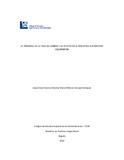La dinámica de la tasa de cambio y su efecto en la industria automotriz

View/
Date
2024-06-06Citación
Metadata
Show full item record
Documents PDF
Abstract
Este estudio analiza cómo las fluctuaciones en la Tasa Representativa del Mercado (TRM) impactan indicadores financieros clave en la industria automotriz colombiana entre 2014 y 2022. Empleando un enfoque mixto y modelos de efectos fijos y aleatorios, se utilizan datos de EMIS y la Superintendencia de Sociedades. Los resultados muestran una correlación positiva entre la TRM y el desempeño financiero del sector.
Abstract
This study examines the impact of exchange rate dynamics on the Colombian automotive industry from 2014 to 2022.
Given the significant influence of exchange rates on economic sectors, this research focuses on understanding how
fluctuations in the Representative Market Rate (TRM) affect key financial indicators such as operating income, costs,
and gross profit within the automotive sector. Utilizing a mixed-method approach, the study employs fixed and
random effects models to analyze data sourced from EMIS and the Superintendencia de Sociedades.
The results indicate a positive correlation between TRM and the industry's financial performance. Specifically, an
increase in TRM is associated with higher operating income and gross profit, suggesting that devaluation of the
Colombian peso may benefit exporters within the sector. However, it also leads to increased costs due to the
higher price of imported components. These findings highlight the dual impact of exchange rate volatility on the
automotive industry, where both opportunities and challenges arise.
The study further discusses theoretical frameworks related to exchange rate
management and provides practical recommendations for policymakers and corporate
strategies to mitigate adverse effects. It underscores the necessity for adaptive
measures and strategic planning to navigate the complexities of a volatile exchange rate
environment.

